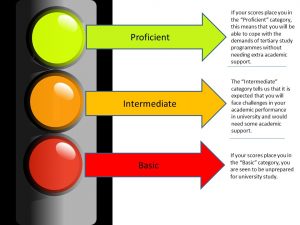What are the National Benchmark Tests?
The National Benchmark Tests (or NBTs) are a set of tests that measure your academic readiness for university. You will be tested on three domains: Academic Literacy, Quantitative Literacy and Mathematics. Academic Literacy and Quantitative Literacy are combined into one 3 hour test (AQL), which is written in the morning (from 8.30am) and Maths (MAT) is written for 3 hours in the afternoon after a lunch break.
When and where can I write?
There are 25 national test dates. The first test of the cycle was on the 26th of May, and the last will be on the 5th January 2019. We have many venues around the country. Visit our website to find our dates and venues.
Are they compulsory?
The NBTs are compulsory at some, but not all universities. If you plan to apply to a range of universities, it would be safest to write the NBTs so that you have the scores if they ask for them with your application. If you plan to apply to just one or two universities, you should check with them to find out whether the NBTs are a requirement.
Should I write before or after applying to university?
That depends on the university. Some only require you to have registered for the NBTs when you apply to the university, while others need you to have written by the time you apply. This is important, as you don’t want to send an incomplete application to a university. Check with them to find out what they need.
The Maths test:
You only need to write the Maths test if you plan to apply to a course that requires maths (like Commerce, Health Sciences, Science, and Engineering). If you’re unsure, check with the university you’re applying to.
You are not allowed a calculator during the Maths test, so make sure you know how to do the simpler calculations without one. Don’t worry: the questions are asked in such a way that a calculator is not necessary. A formula sheet and paper for working out is provided. No marks will be given for working out and there is no negative marking.
The AQL test:
Everyone writes the AQL. Academic Literacy can be compared to Comprehension. You will be given texts similar to those you’d be faced with in university and asked about your understanding of them. Quantitative Literacy can be compared to Mathematical Literacy. You will be given graphs, tables, etc, to interpret and asked real world problems.
All the questions are multiple choice. The AQL has timed sections of between 25 and 30 minutes each. The Maths does not.
How do I prepare for the NBTs?
We don’t make past papers available. Any organisation that claims to be preparing you for the tests is not really doing so, as their courses are not endorsed by us and they have not seen our tests. If you are unsure of any of your maths concepts, make sure you clear those up with your teacher beforehand. Making sure you know how to read and interpret graphs and tables, etc, would also be helpful for the QL part of the AQL test.
Check in on test day is at 7.30am. You’ll start writing at 8.30. Lunch will be at approximately 11.30 until 12 and then you’ll write from 12 until 3. We usually advise parents to fetch at about 3.30.
If you’re going to be writing both AQL and MAT, make sure you pack a good lunch. Your day will be long and tiring and you’ll need sustenance!
What if I fail?
 You can’t, strictly speaking, fail the NBTs. Your scores place you in a benchmark (see our website for details) and each university and sometimes, different Faculties within each university, use your scores in a slightly different way. Check with them to find out which benchmark you need to get into for them to consider your application.
You can’t, strictly speaking, fail the NBTs. Your scores place you in a benchmark (see our website for details) and each university and sometimes, different Faculties within each university, use your scores in a slightly different way. Check with them to find out which benchmark you need to get into for them to consider your application.
Remember that these scores are used in conjunction with your NSCs, and also that most universities will not use the NBTs to exclude you. Many of them use them to decide on the kind of academic support you’ll need after you’re admitted.
If you really feel you could have done better on your first try, you may write the tests again. You may write twice in one year. Again, though, check with the university to which you’re applying: some accept your best scores, while others will only accept your first scores.
Please visit our website for more details. Look particularly at the “Applicants” and the “About” tabs. We cover all your FAQs there.
All the very best of luck to you all and please don’t hesitate to contact us via our Facebook page.

